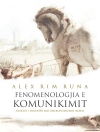To date, the relationship between Otto Kirchheimer and Carl Schmitt has invariably been described as friendly, despite their political differences. Kirchheimer has even been attributed the role of the godfather of today’s left-Schmittianism. With reference to previously unknown archival materials, conversations with personal contacts, and through a new reading of the theoretical works of both authors, including an analysis of the Nazi vocabulary used by Schmitt, Hubertus Buchstein exposes this view as a politically motivated legend. Buchstein claims that the best way to characterize their relationship from their first meeting in Bonn in 1926 up until Kirchheimer’s death in 1965 is as enduring enmity – in a political, a theoretical, and even a personal sense.
Hubertus Buchstein
Enduring Enmity [PDF ebook]
The Story of Otto Kirchheimer and Carl Schmitt
Enduring Enmity [PDF ebook]
The Story of Otto Kirchheimer and Carl Schmitt
Buy this ebook and get 1 more FREE!
Language English ● Format PDF ● Pages 576 ● ISBN 9783839464700 ● File size 3.0 MB ● Publisher transcript Verlag ● Published 2024 ● Edition 1 ● Downloadable 24 months ● Currency EUR ● ID 8639461 ● Copy protection Social DRM












